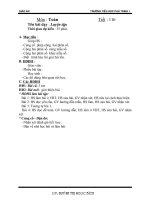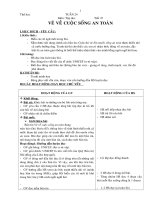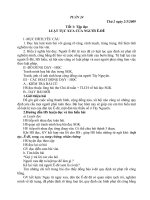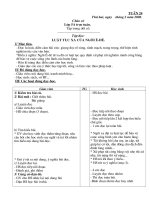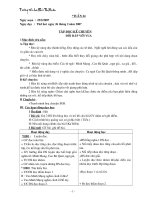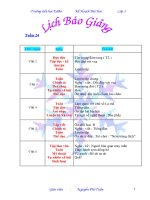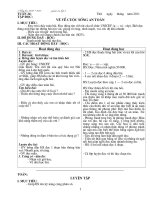Giáo án tuần 24 – Tiếng anh 4
Bạn đang xem bản rút gọn của tài liệu. Xem và tải ngay bản đầy đủ của tài liệu tại đây (133.96 KB, 12 trang )
<span class='text_page_counter'>(1)</span><div class='page_container' data-page=1>
<b>WEEK 24- Period: 93</b>
<i>Date of planning: 18/02</i>
<i>Date of teaching: 4a1, 4a2(20/02); 4a3, 4a4(21/02); 4a5(22/02)</i>
<b>UNIT 14: WHAT DOES HE LOOK LIKE?</b>
<b>Lesson 3 (1-2-3)</b>
<b>I. Objectives:</b>
<b> - </b>By the end of the lesson, Ps will be able to pronounce the sounds of the letters <i><b>th </b></i>in
the words <i><b>this, that</b></i> and <i><b>thin, thick</b> respectively.</i>
<b>II. Language focus:</b>
<b>-</b> Vocabulary and structures: Review
- Phonics: <i><b>this, that</b></i> and <i><b>thin, thick</b></i>
<b>III. Resources:</b>
<b>- </b>Teacher’s: pictures, recording, posters....
<b>-</b> Students’: Book, notebook
<b>IV. Procedure:</b>
<i><b>Teacher’s work</b></i> Students’
activities
<i><b>Warm up.</b></i>
Sing the song <i><b>What do they look like?</b></i>
- Whole class
<i><b>1. Listen and repeat.</b></i>
- Tell pupils that they are going to practise saying the
sounds of the letters <i><b>th </b></i>in the words <i><b>this, that</b></i> and
<i><b>thin, thick </b></i>respectively
- Put the letters <b>th</b> on the board
- Play the recording and ask pupils to repeat three
- Whole class
- Individuals
</div>
<span class='text_page_counter'>(2)</span><div class='page_container' data-page=2>
times
- Put the words this, that, thin, thick and the four
sentences on the board
- Play the recording three times and let pupils say the
sentences chorally and individually until pupils feel
confident. Draw their attention to the target sounds
- Get five pupils to perform in front of
the class. Correct the pronunciation, if
necessary.
- Groups
<b>2. Listen and tick. Then write and say aloud:</b>
<b>- </b>Tell pupils that they are going to listen to two sentences
and circle the correct words.
- Give them a few seconds to read the words in silence.
- Play the recording once or twice for pupils to circle the
words. Remind them to focus on the words with the sound
ie/ea while listening. Check as a class. Then give pupils
time to make sentences with the circled words.
- Call a few pupils to read aloud their sentences and
correct their pronunciation, if necessary.
<b>Key: 1.a, 2.b, 3.a, 4.b.</b>
- Whole class
- Individuals
- Pair work
- Groups
<i><b>3. Let’s chant</b></i>
-Tell pupils that they are going to say the chant “This is
<i>my family”.</i>
- Follow the procedure in Teaching the unit
Components in Introduction.
- Have them read the chant and check comprehension. •
Play the recording a few times for pupils to do choral and
</div>
<span class='text_page_counter'>(3)</span><div class='page_container' data-page=3>
individual repetition. Show them how to chant and do
actions.
- Put the class into two groups to practise chanting and
doing actions. Each of the groups should sing one verse of
the chant. Go around and offer help, if necessary.
- Call two pairs to the front of the class to chant and
do actions. The rest of the class claps along to the
rhythm.
- Individuals
- Pair work
- Groups
<i><b>* Homelink:</b></i>
-Learn by heart the new words and model sentence.
-Be ready for lesson 3: 4,5,6
</div>
<span class='text_page_counter'>(4)</span><div class='page_container' data-page=4>
<b>WEEK 24- Period: 94</b>
<i>Date of planning: 18/02</i>
<i>Date of teaching: 4a1, 4a2(20/02); 4a3, 4a4(21/02); 4a5(23/02)</i>
<b>UNIT 14: WHAT DOES HE LOOK LIKE?</b>
<b>Lesson 3 (4-5-6)</b>
<b>I. Objectives:</b>
- By the end of the lesson, Ps will be able to use words and phrases related to the
topic Physical appearance. Be interested in reading and writing about someone’s
physical appearance.
<b>II. Language focus: </b>
<b>-</b> Vocabulary and structures: Review
<b>III. Resources:</b>
<b>- </b>Teacher’s: Pictures
<b>-</b> Students’: Book, notebook
<b>IV. Procedure:</b>
<i><b>Teacher’s work</b></i> Students’
activities
<i><b>Warm up.</b></i>
-Spend a few minutes revising the previous lesson. Get
two pairs of pupils to go to the front of the class to say the
chant “This is my family”.
- Individuals
- Whole class
<i><b>4. Read and </b></i><b>write. </b>
- Tell pupils that they are going to read the text and
write the answers to the questions
- Tell pupils to read the questions first
- Ask them read the email and focus on the
- Whole class
</div>
<span class='text_page_counter'>(5)</span><div class='page_container' data-page=5>
information needed to answer the questions in pairs
in three minutes
- Give them five minutes to do the task individually,
go around and offer help, if necessary
- Swap their answers before checking as a class,
provide explanations to the answers, if necessary
<b> Key:</b>
1. He is a teacher.
2. He is tall and slim.
3. She is beautiful.
4. Her brother is younger.
5. Marie is shorter.
- Individuals
<i><b>5. </b></i><b>Write </b>
- Tell pupils that they are going to write an email to
their friends to describe their family, using the given
words in the frame
- Have them look at the given words and decide what
they are going to write
- Ask them to write about their father’s and mother’s
appearance
- Give pupils seven minutes to do the task
individually. Go around offering help, if necessary.
- Get them to swap their answers before calling one
pupil read aloud his/her writing .
- Individual
- Pair work
<i><b>6. Project. </b></i>
- Ask pupils to bring a photo of their family and
describe their family members to the class
- Ask them what they can talk about their family
member
- Get one pupil to do a demonstration in front of the
class before starting the activity
- Give them three minutes to think about what they
- Individuals
</div>
<span class='text_page_counter'>(6)</span><div class='page_container' data-page=6>
are going to talk individually and take note. Go
around and offer help
- Call three pupils to the front of the class to do the
task.
<i><b>* Homelink:</b></i>
-Learn by heart the new words and model sentences.
-Be ready for unit 15 -lesson 1 1,2
</div>
<span class='text_page_counter'>(7)</span><div class='page_container' data-page=7>
<b>WEEK 24- Period: 95</b>
<i>Date of planning: 18/02</i>
<i>Date of teaching: 4a1, 4a2, 4a3, 4a4(22/02), 4a5(23/02)</i>
<b>UNIT 15: WHEN’S CHILDREN’S DAY?</b>
<b>Lesson 1- 1,2</b>
<b>I. Objectives:</b>
By the end of this unit, pupils can
use the words and phrases related to the topic Festivals..
Ask and answer questions about popular festivals, using When is + (festivals)? It’s on…
<b>II. Language Focus: </b>
<b>+ </b><i><b>Vocabulary:</b>New Year, Children's Day, Teacher's Day, Christmas, Tet... </i>
<i><b>+ Sentence pattern</b></i>: When's is Christmas? - It's on the twenty fifth of December.
<b>III. Resources: </b>Ss’ book, recording, computer, stereo, (projector), picture of
festivals ...
<b>IV. Procedure:</b>
<b>Teacher’s work</b> <b>Students’</b>
<b>activities</b>
<b>Warm-up: </b>
Spend a few minutes revising the previous unit. Get some
pupils to go to the front of the class to talk about their
family members (e.g. My mother’s name is Lien. She’s a
nurse. She works in a hospital in the town. She’s slim and
tall.)
Whole class
<b>1. Look, listen and repeat.</b>
<b>- </b>Tell the class that they are going to find out about how
to ask and answer questions about popular festivals.
- Ask pupils to look at the four pictures to discuss the
context in which the language is used. Ask questions such as
</div>
<span class='text_page_counter'>(8)</span><div class='page_container' data-page=8>
Who are they? Where are they? And What are they talking
about?
- Play the recording more than once, if necessary, for
pupils to listen and repeat. Do choral and individual repetition,
pointing to the characters speaking.
- Play the recording again so the class can listen and
repeat.
Individuals
Whole class
<b>2. Point and say.</b>
<b>- </b>Tell pupils that they are going to practice ask and
answer questions about popular festivals.
- Have them look at four pictures to identify the
festivals. Teach the words and phrases under the pictures.
- Point to the first picture and do the task with one pupil
as a model. Ask pupils to say the question and the answer
chorally. Repeat the same procedure with the rest of the
pictures.
- Ask pupils to practise in pairs, using the prompts in the
bubbles and the words/phrases under the pictures. Monitor the
activity and offer help, if necessary.
- Select some pairs to demonstrate the task in front of the
class. Check as a class.
<b>Work in pairs. Ask your partners about holidays and </b>
<b>festivals in Viet Nam and other countries.</b>
- Tell pupils that they are going to practise asking and
answering questions about popular festivals/holidays, using
<i>When is …? It’s on….</i>
- Ask pupils to suggest festivals/holidays in Viet Nam
and other countries, and write them on the board.
Individuals
Pairs
</div>
<span class='text_page_counter'>(9)</span><div class='page_container' data-page=9>
- Have pupils work in pairs: One pupil asks When is +
(fetival/holiday)? And the other answers it’s on … Monitor the
activity and offer help, if necessary.
- Select some pairs to role-play the dialogue in front of
the class. The rest of the class observes.
- Pair work
<i><b>4. Homelink:</b></i>
-Learn by heart the new words and model sentence.
-Be ready for lesson 1: 3,4,5
</div>
<span class='text_page_counter'>(10)</span><div class='page_container' data-page=10>
<b>WEEK 24- Period: 96</b>
<i>Date of planning: 18/02</i>
<i>Date of teaching: 4a1, 4a2, 4a3, 4a4,4a5 (24/02)</i>
<b>UNIT 15: WHEN’S CHILDREN’S DAY?</b>
<b>Lesson 1- 3,4,5</b>
<b>I. Objectives:</b>
By the end of this unit, pupils can
use the words and phrases related to the topic Festivals..
Ask and answer questions about popular festivals, using When is + (festivals)? It’s on…
<b>II. Language Focus: </b>
<b>+ </b><i><b>Vocabulary:</b>New Year, Children's Day, Teacher's Day, Christmas, Tet... </i>
<i><b>+ Sentence pattern</b></i>: When's is Christmas? - It's on the twenty fifth of December.
<b>III. Resources: </b>Ss’ book, recording, computer, stereo, (projector), picture of
festivals ...
<b>IV. Procedure:</b>
<b>Teacher’s work</b> <b>Students’</b>
<b>activities</b>
<b>Warm-up: </b>
Spend a few minutes revising the previous unit. Get some
pupils to go to the front of the class to talk about their
family members (e.g. My mother’s name is Lien. She’s a
nurse. She works in a hospital in the town. She’s slim and
tall.)
Whole class
<b>3. Listen and tick</b>
- Tell the class that they are going to listen to three
dialogues about some popular festivals and tick the correct
pictures.
- Have pupils look at the picture to identify the festivals.
</div>
<span class='text_page_counter'>(11)</span><div class='page_container' data-page=11>
Explain that Halloween is celebrated on 31st<sub>October, where</sub>
children dress as ghosts and ask neighbors for sweets. Check
understanding.
- Play the recording more than once, if necessary.
- Ask pupils to listen to the recording and tick the correct
pictures. Tell them to focus on the names of festivals.
- Get pupils to swap their answers before you check as a
class. Monitor the activity and offer help, if necessary.
<b>Key: </b>
1.b 2.a 3.c
Individuals
Whole class
<b>4. Look and write.</b>
- Tell pupils that they are going to complete the answers
to the questions about popular festivals, using the picture cues.
- Give them a few seconds to look at the answers and to
guess the missing words they need to fill the gaps. Then focus
their attention on the pictures. Check comprehension.
Get pupils time to do the task independently. Go around
and offer help, if necessary.
- Get them to swap their answers before checking as a
class. If there is enough time, call some pairs of pupils to act
out the dialogues.
<b>Key: </b>1. the twenty-fifth of December.
2. the twentieth of November
3. the first of June
Individuals
Pairs
</div>
<span class='text_page_counter'>(12)</span><div class='page_container' data-page=12>
<b>5. Let’s sing:</b>
<b>- </b>Tell the class that they are going to sing the song
<i>Happy New Year. Teach the song, following the procedure in</i>
<i>Teaching the unit components in Introduction..</i>
- First, have pupils read each line of the lyrics aloud. Do
choral and individual repetition. Check comprehension. Then
play the recording all the way through.
- Ask pupils to do choral and individual repetition of the
song line by line.
When they are familiar with the tune, ask a group of four
pupils to the front to sing the song.
- Have the class sing the song again and clap their hands
or do actions to reinforce learning.
Individual
Whole class
<b>* Home link</b>:
- Learnt by heart words on festivals.
</div>
<!--links-->
